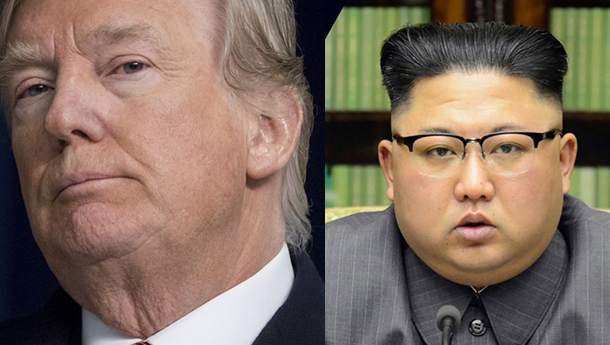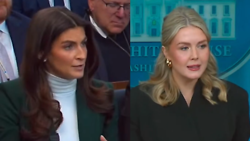The easy part is agreeing to a summit. The hard part is solving the problem. But that doesn't mean we should be entirely cynical.
Some say insanity is doing the same thing over and over again and hoping for a different result. That could apply equally to talking with North Korea and to trying to isolate it into submission. But circumstances change, and sometimes the same action in a different context has different results.
I will admit that at Stratfor, we were a bit surprised at the March 8 announcement of a forthcoming summit between U.S. President Donald Trump and North Korean leader Kim Jong Un. It is not that we thought such a meeting was impossible — far from it. Trump's defining characteristic is that he bucks conventional wisdom and the establishment, and he has said he'd be happy to sit down over burgers with the North Korean leader. But the timing seemed a bit too soon. The U.S. campaign of "maximum pressure" was supposed to force North Korea to the negotiating table and give the United States the upper hand while leaving Pyongyang desperate for relief. North Korea is nowhere near the desperate mark. Thus, accepting a summit at this time may leave Pyongyang with the advantage — at minimum it gives North Korea time without a significant increase in sanctions.
But just as we must exercise extreme caution when assessing the likelihood of any significant outcome from these talks, we also need to admit that we, like many others, argued that constraint without an avenue for dialogue had a pretty limited chance of success. Rather, it was more likely to lead to an accident that could escalate fairly rapidly into higher levels of conflict. Talks of any sort at least provided a space for understanding and de-escalation.
If North Korea has not yet reached the point of desperation — or demonstrated the final proof of its nuclear deterrent — then why offer talks at this time, particularly ones that appear to go against its own imperative for a strong deterrent force? The cynical answer, of course, is that the North Koreans have no desire to give up their weapons, and instead are once again just stalling for time. They threw a Hail Mary pass and figured if Trump declined their offer of a meeting with Kim it would still fit Pyongyang's near-term strategy of painting the United States as the intransigent party, potentially cracking the global consensus around tight sanctions. If that is the case, Trump's unexpected reception of Pyongyang's offer is perhaps as surprising to the North Koreans as it appears to be to the rest of Trump's administration.
As "only Nixon could go to China," perhaps "only Trump could go to North Korea."
But there is another element to consider. The North Koreans may have seen Trump as the outlier president, as someone unconstrained by traditional politics, someone who would call Kim Jong Un "Little Rocket Man" against all diplomatic conventions. Thus, as "only Nixon could go to China," perhaps "only Trump could go to North Korea." Pyongyang's pursuit of nuclear weapons always has been a means to an end, not the end in itself. The "end" is to break the North out of its isolation without giving up its political system, to reshape relations with South Korea, establish diplomatic relations with the United States and end the sense of siege of the Peninsula by U.S. forces. North Korea has always been serious when it said it was willing to trade its nuclear deterrent for the removal of threat to the regime, but the removal of the threat comes either from the withdrawal of U.S. forces or, at the other extreme, from an alignment with the United States itself.
New Leadership, New Pressures
One other difference in North Korea is the new leadership structure. Kim Jong Un is part of the third generation of leaders (he is almost young enough to be in the fourth generation). The first generation, Kim Il Sung and the other revolutionaries, earned their place in the echelons of power through their fight against the Japanese and later against the United States. They were the revolutionary founders. The second generation, represented by Kim Jong Il, claimed power and authority merely from their parentage. They were trained as technocrats in Eastern Europe, the Soviet Union and China — if they were trained abroad at all — and were heavily linked to North Korea's terrorism of the 1970s and 1980s. In any confederation or unification scenario, in any North Korean opening, these leaders were the ones likely to lose out and be sidelined, imprisoned or executed. But there is a new generation emerging in North Korea. This third generation may also claim power because of family connections, but its members were often trained in Western Europe, are largely disconnected from the policies of the 1970s and '80s, and have the potential to remain in power and keep influence in a more open North Korea.
A second factor is the continued rise of China and Japan, and Korea's increasingly narrow space in between them. When China and Japan tangle, Korea is the proverbial minnow between whales. A divided Korea is ripe for exploitation by the larger rivals. A unified Korea, however, or even a Korea with less internal stress, has a better ability to assert its own interests in a fractious Northeast Asia. Both North and South Korea are seeing these pressures, and each, while not ready for the complexities and costs of unification, is being drawn toward accommodation with the other. It is in this context, with the return of a progressive president to South Korea, that North Korea has made this overture.
Changed Circumstances
From the U.S. perspective, North Korea has always been a bit of an outlier. It is a nation that disproportionately attracts U.S. interests, complicates Washington's overall Asia-Pacific strategies and locks up tens of thousands of U.S. forces in a cold conflict. Washington's policies since the early 1990s have basically been predicated on an expectation that the North Korean regime would collapse any day, and thus the core of U.S. strategy was to wait them out. It was not a very proactive strategy, and it has clearly been based on a false assumption about the longevity of the North Korean leadership. Waiting around no longer seems a viable policy, given the stage of North Korea's nuclear and missile development. Even if Pyongyang can't strike Peoria, its weapons program can alter the security dynamic in Northeast Asia. If that can be altered, if North Korea can be resolved or at least mollified, perhaps it can create a new challenge for Washington's more significant strategic competitor in the region — China.
So, on the U.S. side, we have a very different president, we have a clear need to alter a decades-old basic policy that has failed to deliver and we have an opportunity. On the North Korean side, there is a new leader, a last shot before risking a major war with the United States and a potential opportunity. While we shouldn't be too excited about the prospect of peace in our time, we should also not be entirely cynical. This is an excessively complex problem, a Gordian knot of strategic, economic, historical, cultural and personal contentions. But there are deeper elements at play that present a different context for this round of talks.
To paraphrase Eisenhower: The world moves, and things that were not good once may be good now. At best, the summit results in a Korean Peninsula that is largely free from the threat of imminent war, a Northeast Asia that is no longer under the fear of nuclear proliferation and a stronger U.S. strategic position in the Asia-Pacific. At worst, it is another delay, North Korea ultimately goes back on the nuclear path and the United States is forced to either accommodate or attack. But then, that latter option is where we already are today.






